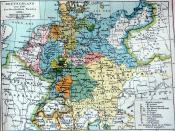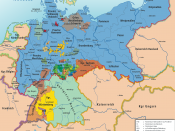The period of 1815 to 1848 was termed 'the time when nothing happened', or the 'Vormärz period' as it started with the Congress of Vienna in 1815, and ended with the revolutions in 1848. However, the term neglects the changes towards unification that were occurring within Germany at the time.
In 1815, Germany faced two significant problems: the unfixed boundaries of the country, and their vulnerability to attack from neighbouring countries, leading to stricter defence and more belligerent foreign policy. The Congress of Vienna dealt with Germany's security and was based on a balance of power; the result was that Germany became a loose confederation of states under Austrian control. However, the question of identifying Germany's frontiers was adjourned due to the creation of the German Confederation. This was created with the aim of 'maintaining the external and internal security and the independence and integrity of the individual states'; although Metternich determination to block the progress of German nationalism meant that the Confederation was structured in such a way that it became impossible for it to become an embryonic state.
The new Confederation compromised 39 small states, and had a central institution known as the Diet, the representatives within the Diet were not elected, but sent by the governments of member states with instructions, and this was supervised by the Austrian representative. It was clear early on that nothing would be achieved by the Diet; no measure could be passed unless every government agreed to it, which rarely happened, as most ambassadors were not thinking about working for the Confederation as a whole entity, rather they were working to safeguarding their individual states interests. There was little possibility for liberalism at the Diet, the vote was dependent on the size of states, which benefited only the larger ones - Austria,



Good
Seems to be well thought out and intresting. A good essay overall.
1 out of 1 people found this comment useful.